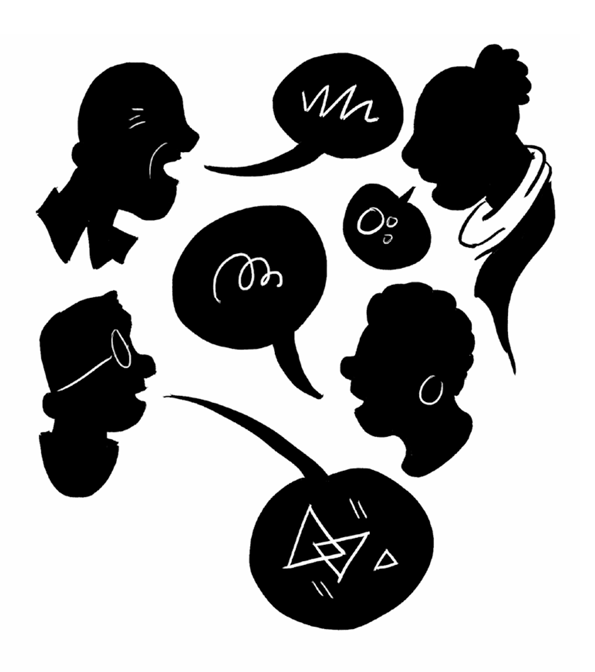The following is an excerpt from “Fragments III: Democracy, “ a journal from T’ruah.
Fragments editor Rabbi Lev Meirowitz Nelson put this question to six leaders on the front lines of pro-democracy work. The following excerpts have been condensed and lightly edited for readability.
Ginna Green, Partner and Chief Strategy Officer, Uprise
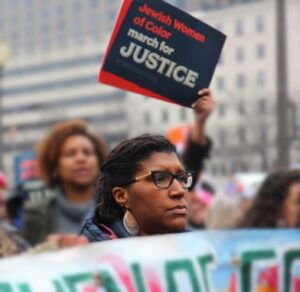
GINNA GREEN (she/they) is a strategist, writer, and movement-builder. As Partner and Chief Strategy Officer at Uprise, she leads the practice on philanthropic advising within the Jewish community and is a principal strategist for its progressive movement and Jewish social justice sector clients. Previously, she worked as Chief Strategy Officer at Bend the Arc, Democracy Program Director at ReThink Media, and Communications Manager at the Center for Responsible Lending. A South Carolina native, Ginna serves on the boards of Bend the Arc, Women’s March, and Jewish Story Partners.
Before joining Bend the Arc, I worked on voting rights, money in politics, and fair courts. Those are “core” democracy issues. But tackling climate justice, reproductive justice, economic justice is democracy work too — both because progress on these issues is exactly what strengthens our democracy, writ-large, and because we achieve these successes through democratic means. So there’s two modes of doing democracy work: on the issues and through the issues.
The reason that I do the work that I do is partially, I think, because I grew up in the South — not even in the shadow of the civil rights movement, really, because the challenges of that era still felt in the light. When you live in the place that formed the foundation of our U.S. systems of oppression and dispossession — and also resistance and hope — I think you see both what has happened here and what can happen here differently. And so for me, I feel like the South is also the way to the future for this country. There is so much history and also so much hope here, for me, and so much home.
One of the reasons why I think it is so challenging right now for us to win the future that we want is because the Right has had a chance to tamper with and destroy, in some cases, the very levers of democracy for the last 40 years. So that has, in a lot of ways, hamstrung our ability to make change, because they have begun to dismantle the very systems by which we do it at national, state, and local levels. This means voting systems and access, including redistricting, election administration, our courts, and more. And one of the things that has been true, one of those important elements, is the reality that more Americans are affected in their day to-day lives by what happens in their state legislatures and in their state courts than in Congress and the Supreme Court.
And so when we think about who and what matters, when we think about the United States and a pivotal election that will determine so much about our future, it isn’t actually just one election. It’s 51 state elections and thousands of local elections. And we don’t actually just have one constitution. We have 51 constitutions. So every U.S. citizen and resident comes under 50 sets of state laws. We are created equal but no longer treated equally anymore. A woman in Texas does not have the same rights as a woman in California. And this atomization, if you will, this non-national state of existence that we have, this patchwork of the 50 states, creates the possibility for any of us to be the most safe and protected or the least.
Abby Lublin, Executive Director, Carolina Jews for Justice
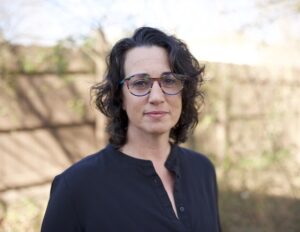
ABBY LUBLIN (she/her), Executive Director of Carolina Jews for Justice, believes in the power of story to transform conflict, build empathy, and act collectively. The story we write together here in North Carolina is that Jews belong in the fight for greater justice, organizing includes your best okra recipes, and that together, with trust and hustle, we can win what we need for all to thrive.
We are at the forefront of assaults on democracy in North Carolina. I’ll give you a very specific example of what Jewish coalition work looks like here. Our partners at Muslim Women For have always had a really robust voter turnout infrastructure. And they said, we’re afraid to be visibly Muslim in public right now. So without question, we devised a plan to do this together. That is a role that Jews, especially white-presenting Jews with cars and access to other resources, can play. We don’t have shtetls [concentrated Jewish populations] in North Carolina. So we literally need to coexist with everybody around us, or else we’ll be remarkably lonely.
We have a lot of partners and even funders who are kind of being blindsided right now, getting these bad faith accusations of being antisemitic. One of their grantees began advocating for ceasefire, for Palestinian lives, and all of a sudden, the outrage machine comes at them from the right, and they’re like, wait, what? We’re antisemitic? What did we do?
We are educating tons of elected officials, partner organizations, funders, everybody, on antisemitism: what it is, how it’s being wielded right now. And we explain to them, here’s where you’re actually kind of traipsing into antisemitism, and you should pull back. And, we got you, but you’re misstepping here. So let me help you out with that.
Antisemitism is showing up as a central feature of the governor’s race; you’ve got a white, moderate, Jewish man who grew up in North Carolina getting these dog whistles and tropes of “he’s not like us.” It’s all of the classic antisemitic tropes and othering. In the school superintendent’s race there’s actually a truck with a billboard parked in front of the progressive Black candidate’s former offices right now accusing them of being antisemitic — but using antisemitic tropes, calling them elitists and globalists.
So there’s a really interesting fear of, “Oh, I’m worried about working with Jews because I’m afraid of being accused of being antisemitic if I express something or do something wrong.” But then there’s also this weird embracing of Jews, like, “Oh, I need Jews to be with me and like me right now.” That’s the landscape that we’re in. And we just dig into our deep, trusted relationships and the work that we’ve done together on the ground. The [opportunities to educate people about] who Jews are could not be bigger than they are right now in this crisis. That we [Jews] have always been here; we belong here.
This is all old and new. And I think that our working in deeply trusted, multiracial coalitional spaces is deeply threatening to white nationalist authoritarian agendas, which is why we’re seeing such commitment and resourcing towards wedging and division and conspiracies.
In North Carolina, we have folks in leadership who have evangelical- driven motivations, who really do believe in the Rapture and are legislating for the afterlife. They are making it less safe for Jews in North Carolina, such that we see Israel as our way out, while also doing everything to protect Israel as a Jewish state, so that we will go there. So that that will accelerate the Rapture. These folks are actually in charge of levying our taxes and spending and setting policy in North Carolina. So for example, utterly defunding our public schools and moving money into vouchers for private Christian institutions is a way of literally resourcing this white Christian nation idea and making public schools less effective, which harms all of us. There have been legislators who’ve expressed that this war in Gaza is the holy war they’ve been waiting for,
We are coming up on the 60th anniversary in June [2024] of the murders of Schwerner, Chaney, and Goodman, which looms really large in the American Jewish imagination around civil rights and social justice. As one of the only southern Jewish social justice organizations, our June newsletter is looking at that picture of Heschel and King marching together in Selma. That is an iconic photo that many Jews turn to — and that was one story and also highly romanticized.
But if you look in the background, there’s a Jewish-owned department store that had a coloreds-only sign, that was very much segregationist. And you had a group of Jews also in the background who were jeering and heckling and violent towards the civil rights activists. And we have to contend with the fact that we are the inheritors of all of these legacies. We need to interrogate how we imagine our role in the civil rights movement.
That’s our calling right now to our people: Are you the foreground folks? Are you the background folks? What are you going to do about it? And lace up our sneakers, let’s go.
Megan Black, Common Good Program Director, Western States Center
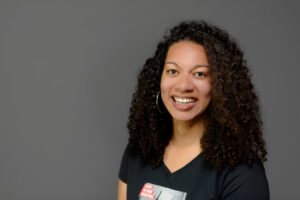
MEGAN BLACK (she/her) is a trainer, facilitator, and organizer. Since 2010, Megan has worked to navigate and bridge the divisions created by race, religion, and politics, with a focus on antisemitism, anti Black racism, and Christian hegemony. She earned her undergraduate degree from the University of Notre Dame and a Master of Divinity from Vanderbilt University. Megan, her husband Keith, and infant daughter Winnie live in Kansas City, Missouri.
The difficulty that multiracial coalitions have is that we are trying to hold together a really heterogeneous group of stakeholders who are clear about the desire for democracy as the safest outcome for all of us, but otherwise have all these differences and tensions. What that means is we’re also having to sink a lot of energy just into negotiating and navigating our own relationships. The thing that keeps coalitions moving is really good communication.
The Jewish community has a lot of work to do internally to navigate the really big feelings that are coming up right now [since October 7]. There’s deep senses of betrayal, fear, anxiety, outrage, and people need to find a way to process those emotions so that what drives actions is not feelings, but strategy. We need people talking with each other about how they’re feeling in this moment, what they’re seeing, how they’re making sense of it from both their non-Jewish and Jewish perspectives. But people are getting blowback. It’s easy for me to say, “Oh, lean into the relationship.
Have a conversation. People will listen.” But they might not like it. It might actually go really badly. I’m empathetic to that fear — and I just don’t think that fear can be the final answer.
We need to get really clear about the threat, and the threat is not each other. But because of the heightened tensions, it can feel like we are each other’s enemies.
It’s really about being able to be in a place where we can make strategic decisions that have the long game in mind and that have a really clear understanding of where Jewish safety is. It may not be for me to say what makes you safe, but from my stake as a Black woman, I know that I need the Jewish people in my life to understand that our safety is intertwined.
As a Christian woman of color, I think there’s so much work to do to examine and be accountable to anti-Jewishness in Christian communities. My context is the Midwest and it’s extraordinarily segregated. I grew up in Iowa, where I knew one Jewish person. People don’t appreciate how deep the illiteracy goes when it comes to understanding the Jewish community — [or] the depths of Christian supremacist thinking, which sees Jews as inferior or antagonistic at worst and as misguided and confused at best.
People can go their entire lives where I’m from without ever meeting a Jewish person. And so all they’re left with are the ideas that are communicated to them through their church, through the media, through social media. That’s what shapes their thinking. The same [goes] for their understanding of Israel and Palestine. All of that is mediated not by Jewish people, Muslim people, Palestinian people, but by what they encounter online and in their congregations. It’s really, really hard to communicate how much of a deficit we’re starting at in the Midwest with non-Jews when it comes to really understanding these issues.
I do a lot of training on antisemitism, and one thing that there’s rarely time for is real wrestling with the history of assimilation in the white Jewish community, and what that means for relationships across lines of race and religion. I think sometimes there can be a fixation on antisemitism, which frankly needs to be there because we need to understand this better. But emphasizing antisemitism can then become: This is our answer to racism. The answer to racism becomes, “but also antisemitism!” And that just cannot be the answer; it will not get us anywhere.
We have to find a way to hold that people can participate and benefit from a system of white supremacy and racism, and also suffer from antisemitism. And people have to have those skills to acknowledge that, and to own that, when they’re in relationships with people who do not benefit from systems of racism.
Rabbi Aryeh Cohen, Professor of Rabbinic Literature, Ziegler School of Rabbinic Studies
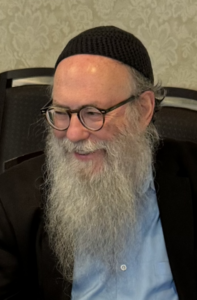
RABBI ARYEH COHEN, PHD (he/him) is Professor of Rabbinic Literature in the Ziegler School of Rabbinic Studies, a co-convener of the Black Jewish Justice Alliance (BJJA), and a member of Clergy for Black Lives. He is the president of the Society of Jewish Ethics, a Commissioner on the Los Angeles City Ethics Commission, and he serves on the District Attorney’s Interfaith Advisory Board. His latest book is “Justice in the City: An Argument from the Sources of Rabbinic Judaism.”
Right now, for understandable reasons, everybody on all sides is just focusing on Israel-Palestine. All kinds of other awful things are happening in this country. I mean, the police didn’t stop shooting Black and brown people because of October 7; people weren’t miraculously housed; the schools didn’t miraculously get funding. [Those perennial domestic issues] contribute to an anti-democratic atmosphere. In order to create a more perfect union, you need people who have the time to think about issues that are important to the country.
Matthew Desmond, in his book “Poverty, by America,” talks about the poverty tax. The poverty tax is: If you’re working three jobs, you are constantly tired, and there are studies that show — it’s like, if you haven’t slept all night, and then you’re driving a car, you make bad decisions. You don’t have the wherewithal to make good decisions, and therefore you can’t really be part of the decision-making mechanism which is at the heart of democracy. So I think that the Jewish community has to go back and support all these domestic concerns, and not let everything take a back chair to: Is this person going to [unquestioningly] send money and weapons to Israel?
I think Jewish support for democracy should be ideological and principled. Rav Hayyim Hirschensohn (1857-1935), in his book, Malki BaKodesh, argued for democracy. He was asked if the Jewish State needed a king. And so his answer started from this halakhic principle, which is fascinating. He says that Jewish law cannot do anything that goes against what he says is the best ways of civilization. In other words, there’s an ethical component to halakhic decision-making. And in that question about a king he rereads “shoftim and shotrim.”¹ He rereads minui shoftim [the appointment of officials] as democratic elections. He talks about Sefer Shoftim as not being the Book of Judges but the book of elected officials. You know, all those individuals, Dvora and Shimson, those were people who were actually selected by the people. So then all those laws about fraudulent judges, he reads against fraudulent elections and fraudulent elected officials. So he turns shoftim into an argument or a set of laws about democracy. It’s a fascinating teshuvah.
One specific area is the criminal legal system. Our sources are extremely critical of the carceral system that we have. For instance, Rabbi Chaim David HaLevy (1924-1998), who just says outright that punitive incarceration is not found in the sources. And even though there are some who do find them in the sources, they’re all assuming that people are treated humanely in prisons. Anytime a police officer pops up in the Gemara, it’s bad. It’s usually a Roman. If you look at the Rishonim [rabbis from approximately the 11th-15th century], there’s no respect for policing. HaLevy tries to retrieve policing, but there’s an assumption — which is completely cut off from reality — that cops are totally versed in law and are treating people appropriately. The baseline is: The cops keep upper middle-class white people safe — but don’t actually keep Black and brown people safe. U.S. Jewish communities inadvertently buttress that system by arming synagogues to the hilt.
I think that, as rabbis, our job is to say: How do we figure out how we create safety in a holy community? That has to do with honoring each other, with sitting with each other. All these things are intertwined. The problem is, we think of security in terms of a gun. And this goes from local community security to foreign policy, and because we have a gun, because the gun is on the table, everything else goes out the window.
Matthew David Hom, Faith-Rooted Organizer in Los Angeles and Santa Monica, Clergy & Laity United for Economic Justice (CLUE)
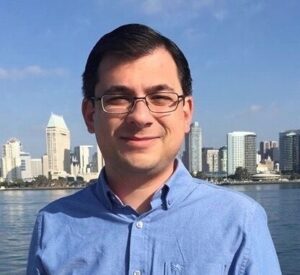
MATTHEW DAVID HOM ( taam4 wai5 hung4) (he/him) is the Los Angeles and Santa Monica Organizer at Clergy & Laity United for Economic Justice (CLUE), a Southern California-based nonprofit that mobilizes diverse faith leaders in solidarity with workers and labor unions, and for racial, immigration, and housing justice. Rooted in his multiracial Chinese and Ashkenazi histories, he organizes on the Jewish Left via lfNotNow, Bend the Arc, Never Again Action, and Tzedek Lab.
For Jewish communities to be really active and vibrant members of multiracial justice-rooted coalitions in our different cities in the U.S., it means being willing to challenge assumptions that many in the American Jewish community have about the justness of the American economic and racial system.
In a way, that’s this liberal myth that forms a lot of even the American Jewish communal focus on tikkun olam and social justice. It wants to confront overt expressions of racial hostility or racial discrimination, as well as very clear examples of economic exploitation, but it still finds a fundamental justness in the way that our economic system works — even in the way that it reflects racial disparities — precisely because that system has allowed many in the American Jewish community, especially white Jewish folks, to have economic and social mobility.
In order for Jewish community really to be a transformative part of BIPOC-led racial justice and economic justice movements, we have to overcome this binary of Jewish folks and Black folks, Jewish folks and people of color, that not only erases Jews of Color but also assumes a framework that is transactional allyship rather than a more challenging framework, which is accompliceship.
Allyship is good. Allyship is important. It reflects an acknowledgment that a situation is unjust, and a desire to commit time, resources, capacity to address it and to challenge it.
Accompliceship actually centers the voices and leadership of the most directly impacted communities, and also is more willing to challenge — whether ideologically or materially in real life — the fundamental systems or presumptions of the system itself. So as an example: Allyship is to stand against an overt expression of racial discrimination. That’s very important. That’s essential. But accompliceship is actually centering the voices of communities of color at times where they say, what we need is not just visibility or uplifting of some BIPOC voices, but actually fundamental changes and challenges to the systems that we live in…
In a place like Los Angeles, interfaith work becomes an accessible space and opportunity for Jewish community to engage in a very intentional way with communities that are most directly impacted by things like economic exploitation, oppressive capitalism, racial inequity, and the like.
I even like to think about it geographically. “Jewish Los Angeles” — as a reflection of communal imaginations and priorities, if not the actual reality of where and with whom diverse Jewish Angelenos live — is so geographically restricted, and also racialized as existing within white Los Angeles. Doing the interfaith work for economic and racial justice that I do at CLUE allows people in Jewish community to broaden their understanding of the cities where they live, and to get to know people within a broader geography and through different cultural, religious, ethnic, and racial communities.
Graie Hagans, Chief Vision Officer, Bend the Arc
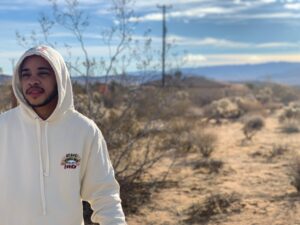
GRAIE HAGANS (he/they): In their full-time work as Chief Vision Officer at Bend the Arc, they work to build a mulitracial democracy. They hold an MPP from Rutgers University, are a founding member of the Black Jewish Liberation Collective, and serve on the board of Jews in All Hues. They are native of St. Louis and have a deep love for community and the possibilities of olam haba.
I’ve been watching our community move from a stance of allyship into one that is leaning much more towards solidarity. I remember 2016, 2017, the fear of authoritarianism — and Jews seeing [authoritarianism] as something that was going to be ushered in on the backs of other people; that we as a Jewish community were going to stand in that gap, and we were going to be part of the vanguard that was going to keep people safe. I’ve been watching our community move from that kind of “we’re protected” mentality to a community that sees that the outcomes of things actually impact us as well.
I think a lot about the language of the Erev Rav, that there is this “mixed multitude” that leaves Egypt with us. It was a long-time pet peeve of mine that, in progressive Jewish spaces, the plagues would be named as, like, poverty and racism. And I said, wow. What a disempowering, de-agenting story and perspective on the plagues. The plagues, in my view, actually were a whole set of escalatory tactics, in order to rally a set of people to understand themselves as being in a framework that was not their own. As an organizer, we say that good actions make the invisible visible. This whole set of plagues uncovered the systematic oppression of Pharaoh’s narrow place. It shone all this light on the invisibility of the hierarchy, in which a whole wide swath of people who were implicated in that society actually start to see themselves in relationship to the Israelites.
My hope, from this movement from allyship towards solidarity I’ve been watching and experiencing and building in our community for the last decade or so, is that we’re building the kind of Erev Rav, the kind of mixed multitude, that sees our fate not just here, in the narrowness of the confines of racial capitalism, of settler colonialism, of patriarchy, of et cetera, et cetera, but actually sees a possibility that there is something else that we actually can be if we choose it together. Then we leave Mitzrayim and wander around for 40 years. There’s a whole bunch of building and unbuilding that happens in there. And I think solidarity is a place that we get to on the other end.
The attacks on DEI — this is purposeful. This is actually not some groundswell of people of their own volition. I don’t mean that in a conspiratorial way. I mean that as an organizer, genuinely: It’s someone’s work to do that. This is a continuation of what a year or two ago was the anti-CRT campaign, to make critical race theory a particular kind of boogeyman that reveals such an ugly reflection of who we are and who we desire to be, and therefore we must get rid of it.
In progressive and leftist spaces, we’ve gotten somewhat clear about the tactics of division. We struggle more to understand the tactics of unification from the right. Evangelical Christian identity and Christian nationalism are critical unification strategies for the right. And I think being able to mobilize towards a story of America also is a unification tactic. Attacks on DEI and CRT let them move forward with their story of what America is and what America should be.
I’m not the most optimistic person, but I have a whole bunch of nieces and nephews that I deeply, deeply love who are growing up in Texas and Missouri and Louisiana. And I have to be in a place of choosing something. I cannot totally betray [their] future by totally giving up hope and saying there is no story of that future.
That takes me right back to the Erev Rav, to the exodus. It wasn’t that everybody was on board. That’s why you get this whole campaign of escalation to help people see: Maybe you don’t know what’s possible over there yet, but are you clear yet that you can’t stay here? Are you clear yet that this place actually does not serve us and is not for us?
And I’ve been thinking a lot more about what’s a trans perspective to bring to this as well. We could all be transformed and we could all be something very, very different.
My job is to think as far ahead as I can about “…But what if we did win? But what if on the other side it was milk and honey? But what if on the other side we were all safe and beautiful and whole and healed and free?” Is that enough to pull us one step forward?
NOTES
¹ Deuteronomy 16:18

